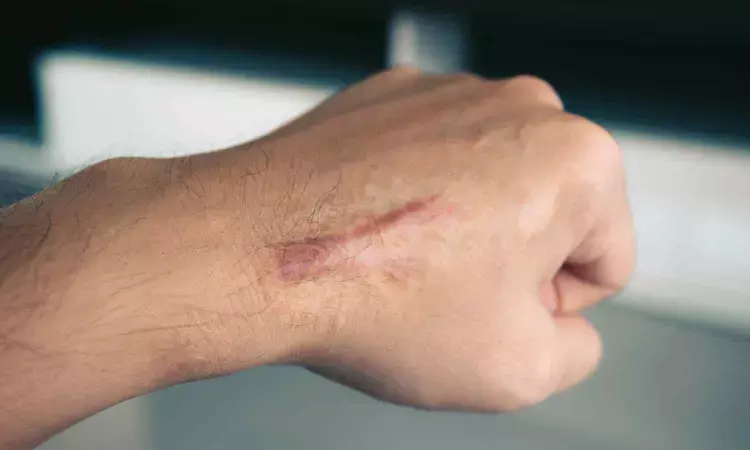- Home
- Medical news & Guidelines
- Anesthesiology
- Cardiology and CTVS
- Critical Care
- Dentistry
- Dermatology
- Diabetes and Endocrinology
- ENT
- Gastroenterology
- Medicine
- Nephrology
- Neurology
- Obstretics-Gynaecology
- Oncology
- Ophthalmology
- Orthopaedics
- Pediatrics-Neonatology
- Psychiatry
- Pulmonology
- Radiology
- Surgery
- Urology
- Laboratory Medicine
- Diet
- Nursing
- Paramedical
- Physiotherapy
- Health news
- Fact Check
- Bone Health Fact Check
- Brain Health Fact Check
- Cancer Related Fact Check
- Child Care Fact Check
- Dental and oral health fact check
- Diabetes and metabolic health fact check
- Diet and Nutrition Fact Check
- Eye and ENT Care Fact Check
- Fitness fact check
- Gut health fact check
- Heart health fact check
- Kidney health fact check
- Medical education fact check
- Men's health fact check
- Respiratory fact check
- Skin and hair care fact check
- Vaccine and Immunization fact check
- Women's health fact check
- AYUSH
- State News
- Andaman and Nicobar Islands
- Andhra Pradesh
- Arunachal Pradesh
- Assam
- Bihar
- Chandigarh
- Chattisgarh
- Dadra and Nagar Haveli
- Daman and Diu
- Delhi
- Goa
- Gujarat
- Haryana
- Himachal Pradesh
- Jammu & Kashmir
- Jharkhand
- Karnataka
- Kerala
- Ladakh
- Lakshadweep
- Madhya Pradesh
- Maharashtra
- Manipur
- Meghalaya
- Mizoram
- Nagaland
- Odisha
- Puducherry
- Punjab
- Rajasthan
- Sikkim
- Tamil Nadu
- Telangana
- Tripura
- Uttar Pradesh
- Uttrakhand
- West Bengal
- Medical Education
- Industry
Post excision radiotherapy useful adjuvant treatment option for refractory keloids: Study

Post-excision radiotherapy useful adjuvant treatment option for refractory keloids suggests a study published in the Dermatology.
Keloid is an abnormal proliferation of scar tissue that grows beyond the original margins of the injury. Even after complete resection, recurrences are common and pose a poorly understood challenge in dermatology. There is lack of large prospective clinical trials; thus, treatment recommendations are based on retrospective analyses and small cohort studies. Superficial radiotherapy is recommended in recurrent keloids; however, the successful treatment rates vary greatly. The aim of this study was to evaluate the keloid recurrence rate after post-excision soft X-ray radiotherapy and the associated factors. Methods: We reviewed retrospective data of all patients, treated with adjuvant post-excision soft X-ray radiotherapy with 12 Gy in 6 sessions at the tertiary referral center, Department of Dermatology, University Hospital Zurich, Switzerland, between 2005 and 2018. We analyzed individual keloids as separate cases. Successful treatment was defined as no sign of recurrence within 2 years. Results: Of the 200 identified patients, 90 met the inclusion criteria and were included in the final analysis. In 90 patients, 104 cases of treated keloids were analyzed. Keloids were mainly located on the trunk (49%) and were mostly caused by previous surgery (52.2%). 50% of the keloids did not relapse within 2 years after therapy.
A significant factor leading to recurrence was the presence of previous therapy, with prior topical therapies, such as steroid injections or 5-fluorouracil, leading to most relapses. 69.2% of keloid cases who relapsed were pretreated. Soft X-ray radiotherapy was well tolerated, with posttreatment hyperpigmentation noted in 34% of patients, particularly in patients with non-Caucasian origin (61.3%). Treatment of refractory keloids is difficult. Post-excision radiotherapy is an established adjuvant treatment option; nevertheless, recurrence rates are high, especially in pretreated keloids. Prospective studies determining the exact dosage and fraction of post-excisional radiotherapy are needed to determine the optimal radiation parameters.
Reference:
Egle Ramelyte, Michèle Welti, Fabian Gardin, Julia-Tatjana Maul, Reinhard Dummer, Laurence Imhof; Post-Excision Soft X-Ray Radiotherapy for Keloids: Experience in a Tertiary Referral Center. Dermatology 2024; https://doi.org/10.1159/000539782
Dr. Shravani Dali has completed her BDS from Pravara institute of medical sciences, loni. Following which she extensively worked in the healthcare sector for 2+ years. She has been actively involved in writing blogs in field of health and wellness. Currently she is pursuing her Masters of public health-health administration from Tata institute of social sciences. She can be contacted at editorial@medicaldialogues.in.
Dr Kamal Kant Kohli-MBBS, DTCD- a chest specialist with more than 30 years of practice and a flair for writing clinical articles, Dr Kamal Kant Kohli joined Medical Dialogues as a Chief Editor of Medical News. Besides writing articles, as an editor, he proofreads and verifies all the medical content published on Medical Dialogues including those coming from journals, studies,medical conferences,guidelines etc. Email: drkohli@medicaldialogues.in. Contact no. 011-43720751


